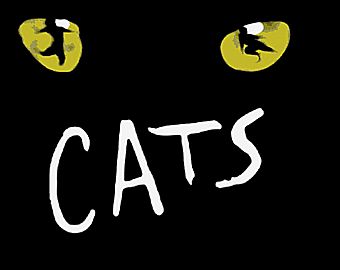
Logo for "Cats" of 1981, one of the longest running stage productions in recent history. Click for original cast recording CD.
The sample MP3 version of “Memory” offered here, later below, is by Barbra Streisand, from her 1981 album, Memories. The Streisand single of “Memory,” released in 1982, reached No. 52 on the Billboard Hot 100 chart, No. 9 on the Billboard adult contemporary chart, and No. 34 in the U.K. Lyrics for the song also appear further down the page in a separate sidebar. Rough videos of Streisand singing “Memory” in the studio circa 1981 had been circulating on the web, and may still be available on You Tube and other sources. More on “Memory” and its lyrics in a moment. First some background on Cats and Grizabella.
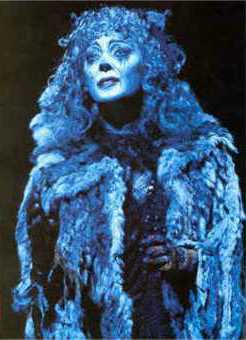
Elaine Paige as the original Grizabella.
Cats is based in part on the works of poet T. S. Eliot, and his Old Possum’s Book of Practical Cats. As a child, Andrew Lloyd Webber had been read Eliot’s poems by his mother. Sometime in the 1970s, he picked up a copy of Eliot’s poems and began ruminating on their use in his music. Over some years, the Cats production would gradually take form in Lloyd Webber’s mind. A number of the named Cats that would appear in Webber’s production have their origins in Eliot’s poetry. Grizabella, however, is not found in Eliot’s Old Possum’s Book of Practical Cats. But she does appear to be partly based on the woman mentioned in one part of Eliot’s poem, “Rhapsody on a Windy Night,” excerpted below. She is also the subject in some unpublished fragments of Eliot’s work titled, “Grizabella the Glamour Cat.”
In the Cats musical, in any case, Grizabella becomes a prominent and poignant character. She is named the “Glamour Cat,” something of misnomer it turns out, since she is typically depicted in the production as a silvery blue-gray queen cat with tattered fur — a cat, quite frankly, who has seen better days.
|
Grizabella Origins (1) “Rhapsody on a Windy Night” …Remark the cat (2) “Grizabella, the Glamour Cat”* She haunted many a low resort |
Grizabella does not have a clearly stated backstory in Cats. However, at some point in her life, she appears to have become enamored with the glamorous life and left her group, the Jellicle Tribe, to pursue that course.
Jellicle is a term also taken from T. S. Eliot’s work, introduced in his poem Song of the Jellicles, describing cats that are peaceful and pleasant by day, but who also love an active nightlife. Jellicles are also featured and named in the Cats musical.
Grizabella appears in the play returning to the Jellicle group. After a time in the glamorous world, she became disillusioned with her new lifestyle and fell upon hard times.
According to some interpretations, she may have even descended into prostitution, or as one reviewer later put it, “a fallen feline who has roamed the lowest alleys.”
In any case, Grizabella returns home to find that the majority of her former Jellicle group are disgusted, ashamed, and afraid of her.
Upon her return later, she sings “Memory,” revisiting the old days when she was young and beautiful — then a real “glamour cat.” The song is also part appeal to the group, as Grizabella wants to begin a new life.
|
“Memory” Midnight, Memory, Every street lamp seems to beat Daylight, Burnt out ends of smoky days, Touch me, |
Unbeknownst to Grizabella, Old Deuteronomy, the leader of the Jellicle group, overhears her and decides that she should be welcomed back and forgiven. In fact, he decides that Grizabella is the one cat worthy to travel to the Heaviside Layer — the place where Grizabella can be reborn (they all have nine lives, you know). In the musical, one cat is chosen each year by Old Deuteronomy to go to the Heaviside Layer and begin a new life. One song in the production is titled, “Journey to the Heaviside Layer.” In the end, Grizabella is forgiven by all and ascends to the Heaviside Layer.
Music Player
“Memory” – Barbra Streisand
“Memory,” meanwhile, is a very powerful song, with broad appeal, even to those who have never seen the play. And for those who have, the song is attached to the imagery of the production and its storyline. But “Memory,” in any case, has deep emotional reach, appealing to certain universal truths and longings in many of its listeners — to that deep well of nostalgia, the longing backward glance, the wistful remembrance of nimble youth, and the feelings of vulnerability that come with aging. “Memory,” in short, provides a lot of reminiscent latitude, accounting no doubt for the song’s popular appeal.
Song History
“Memory,” it turns out, was a last-minute creation for the Cats production. Lloyd Webber’s usual way of working on a song was to first to create a melody and then add lyrics. And he very much wanted to compose melodies for Eliot’s poems that he loved. In the course of the musical’s development, T.S Eliot’s widow, Valerie, gave Trevor Nunn and Cameron Mackintosh — director and producer of the project — additional manuscripts her husband had written. Among these were poems and fragments Eliot had not included in his published work, fearing they might be too unsettling or inappropriate for children. One of these was the poem fragment, “Grizabella the Glamour Cat” shown earlier above, which became an inspiration for Webber and team.
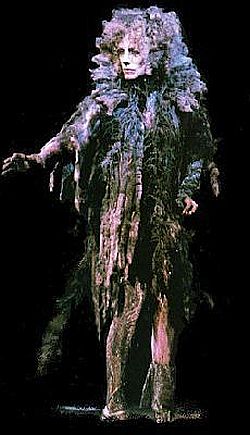
Betty Buckley as Grizabella.
In the musical, “Memory” is performed briefly in the first act and in its entirety near the end of the show, at the climax, as Grizabella delivers her nostalgic remembrance of her glorious past along with her plea to start life anew. It is by far the musical’s most popular and well-known song.
Elaine Paige was the original Grizabella in London in 1981 and also played the Glamour Cat in the 1998 video, which reportedly became one of the best-selling music videos in America and the U.K. The original version of “Memory,” re-recorded with the video, rose again to No. 36 on the U.K. music charts in October 1998. Betty Buckley was the first to play Grizabella on Broadway. Laurie Beechman played Grizabella at New York’s Winter Garden Theater in the latter 1980s and was also first to play the part with a U.S. touring company. Linda Balgord played the role on Broadway in 2000.
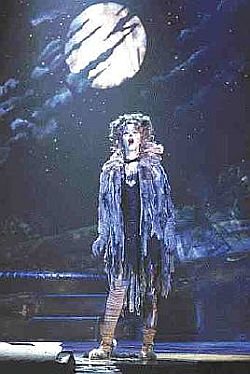
Tricia Tanguy playing Grizabella in a 2008 road production of “Cats.”
Cats’ Success
Cats, meanwhile, became a wildly successful theater production. It first opened in London’s West End in 1981 and then on Broadway in 1982. The London production of Cats ran for 21 years and the Broadway production ran for 18, both setting long-run records. It played 8,949 performances in London and held the record there as longest running musical until October 2006 when it was surpassed by Les Misérables.
On Broadway, at the Winter Garden Theater, Cats set the longest-running record in June 1997, playing a total 7,485 performances before its final show in September 2000. Only The Phantom of the Opera, also an Andrew Lloyd Webber production, had more performances. As of early 2010, Cats remained Broadway’s second longest-running show in history.
Lloyd Webber, in fact, had quite a run of successful shows in the 1980s and beyond. At one point in December 1990, two of his musicals, Cats and The Phantom of the Opera — along with Les Misérables by Claude-Michel Schönberg and Alain Boublil — were grossing about $1.5 million a week. These three were then the longest-running shows on Broadway, each also playing in London at the time.
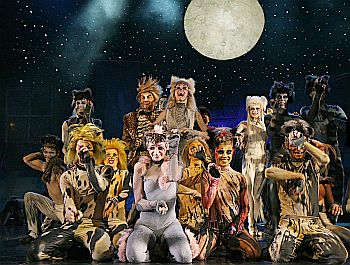
The cast from a December 2007 production of "Cats" at the Roma Musical Theater in Warsaw, Poland.
In 1998, Lloyd Webber produced a video version of Cats, based upon the stage version, released on VHS and DVD. Cats has been translated into more than 20 languages and has been performed around the world many times. The production has also been broadcast on television worldwide.
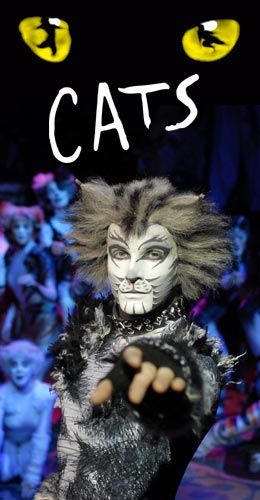
Promotional photo for "Cats" production.
Grizabella and “Memory”, meanwhile, continue to hold a favored place in the hearts of many music fans and theater goers. In 1998, the Times’ Peter Marks described the song as having joined other “enduring melodies,” such as “Shall We Dance?,” “Maria,” and “Send in the Clowns” in “the pantheon of immortal show tunes.”
For more stories at this website on the history of music and/or film, please visit those respective category pages, or go to the Archive or Home pages for additional story choices. Thanks for visiting — and if you like what you find here, please make a donation to help support the research and writing at this website. Thank you – Jack Doyle
________________________________
Date Posted: 19 July 2010
Last Update: 20 July 2019
Comments to: jdoyle@pophistorydig.com
Article Citation:
Jack Doyle, “Memory & Cats, 1981-2010,”
PopHistoryDig.com, July 19, 2010.
___________________________
Sources, Links & Additional Information
 "Cats" production photo. |
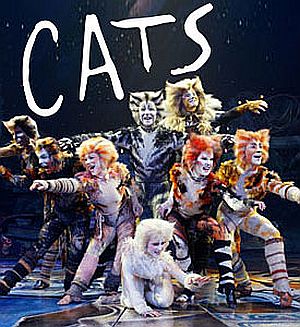 "Cats" promotional photo. |
Mel Gussow, “London to Broadway — From ‘Nickelby’ to ‘Cats’,” New York Times, July 26, 1981.
Carol Lawson, “Broadway; Eliot’s Book of Cats about to Have New Life as a Musical,” New York Times, Friday, December 11, 1981, p. C-2.
“‘Cats,’ a Hit in London, Sets Broadway Dates,” New York Times, April 21, 1982.
Frank Rich, “Stage: London’s ‘Cats,’ a New Webber Musical,” New York Times, June 22, 1982.
“Cats” and “Memory,” Wikipedia.org.
“History of The Creation of ‘Memory’,” estherstilwell.com
“Grizabella,” Catanna.com.
“Grizabella” and “Elaine Page,” Wiki- pedia.org.
Richard Corliss, Elaine Dutka, “Show Business: Making the Cats Meow,” Time, Monday, September 27, 1982.
T.E. Kalem, “Theater: O That Anthro- pomorphical Rag,” Time, Monday, October 18, 1982.
John Rockwell, “Andrew Lloyd Webber Superstar,” New York Times, December 20, 1987.
Mervyn Rothstein, “For ‘Cats,’ Nine Is the One to Celebrate,” New York Times, October 7, 1991.
William Grimes, “With 6,138 Lives, ‘Cats’ Sets Broadway Mark,” New York Times, June 19, 1997.
|
Please Support Thank You |
Peter Marks, “Cover Story; Broadway’s ‘Cats’: Restaged for Eternity (And We Thought They Were Kidding!),” New York Times, November 1, 1998.
T. S. Eliot, “Rhapsody on a Windy Night,” originally printed in Blast, July 1915.
Gary Smith, “A Purr-fect Grizabella,” The Hamilton Spectator (Hamilton, New York), February 11, 2008 (photo of Tricia Tanguy as Grizabella).
Mervyn Rothstein, “The Musical Is Money to His Ears,” New York Times, December 9, 1990.
____________________________________________